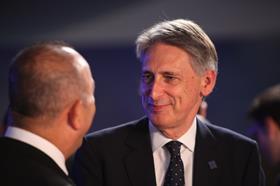
Free movement to the UK will end when Britain exits the EU in March 2019, Theresa May's spokesman has insisted, as the government struggles to contain cabinet disagreement over immigration after Brexit.
After days of contradictions and infighting, Downing Street said on Monday that there was 'broad agreement' in the government on the issue, dismissing reports that the government was seeking an “off-the-shelf” model for a post-Brexit transition period.
Chancellor Philip Hammond has been pushing for some form of temporary arrangement to maintain trading conditions with the EU for at least two years after Brexit. Such a deal could be identical to the arrangements the EU already has with countries such as Norway and Switzerland, which give these countries access to the single market.
But May's spokesman said it was “wrong” to suggest free movement would “continue as it is now” once Britain leaves the EU, echoing comments from immigration minister Brandon Lewis last week.
In the past few days both chancellor Philip Hammond and home secretary Amber Rudd have said they want to see a transitional arrangement when Britain leaves the EU, suggesting that free movement would continue temporarily.
Hammond said on Friday last week that immigration rules should not be changed immediately when the UK leaves the bloc, proposing the use of a registration system for people coming to work in Britain during the transition period.
But the secretary for international trade, Liam Fox, said that such a step would 'not keep faith' with the referendum result, adding that the cabinet had not yet agreed its stance on immigration.
It was also rumoured that Boris Johnson was set to quit the government over Brexit, with a war of words erupting between the foreign secretary and Lib Dem leader Sir Vince Cable. But the prime minister's spokesman tried to quash this speculation, saying Johnson was 'doing an excellent job'.
He said details of a post-Brexit implementation period were up for negotiation, but dismissed reports that the government was seeking an 'off-the-shelf' solution – a positionPhilip Hammondis believed to have put to business leaders, the Financial Times reported last week.
The prime minister's official spokesman insisted that Number 10's position remained the one she set out in her Brexit speech at Lancaster House in January. 'The prime minister's position on an implementation period is very clear and well known,' he said.
'Free movement will end in March 2019. We have published proposals on citizens' rights. Last week, the home secretary said there would be a registration system for migrants arriving post-March 2019.
'Other elements of the post-Brexit immigration system will be brought forward in due course. It would be wrong to speculate on what these might look like or to suggest that free movement will continue as it is now.'
Downing Street also said it remained committed to reducing immigration but accepted that 'it will take time to get immigration numbers down'.



